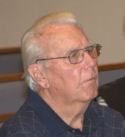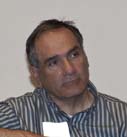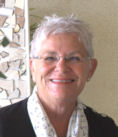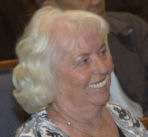The Benediction (The Blessing)
As people exit after the Sunday worship service, I regularly stand at the end of an aisle. As they pass, I take their hands and, with a smile and eye-contact, I say "Peace be with you," or "God bless you." Most seem to cherish and value both the touch and the words. Some even seem to glow a little. They have been blessed, and it makes a difference.
A man told me recently that I had touched his shoulder as I walked by at a big dinner-event. "I felt blessed", he said. I was unaware that I had done such a thing.
Words, touch, prayer, can powerfully communicate grace and peace. "Grace" is a glimpse, a taste, an awareness, of the sheer generosity of God's heart. "Peace" is a strong awareness of the goodness of life with Jesus. The Benediction is planting those vital truths in our hearts.
When the Pastor, at the conclusion of a worship service says, "Receive the Benediction", something important is about to happen. It is not mere words signaling the conclusion of the time together. Whoever says, "The Lord bless you and keep you...." is delivering more than a farewell. These words, when received with respect and openness, are spirit-lifting, healing, hope-generating gifts of God to the waiting people. Pastors usually deliver the words of The Blessing as if they are sending the personal touch of the Lord.
The Benediction, or The Blessing, has a long history in the Christian church. Until recently, only the formally ordained spoke those special words, with an arm or both arms raised and extended.
The Benediction recently was given a tremendous rejuvenation by an esteemed Christian psychologist,Paul Pruyser. He said:
In corporate worship the introductory phrases, "Our help is in the name of the Lord," or "Grace be unto you and peace," accompanied by the gesture of one uplifted arm slightly bent toward the congregation is an ancient and almost completely self-explanatory cultic gesture. Sometimes both hands were used, spread out with the palms turned invitingly to the congregation.
At the end of the service came a more magnificent variant of the same gesture during the solemn and yet intensely benevolent pronouncement of the Benediction. "The Grace of the Lord Jesus Christ, the Love of God, and the Communion of the Holy Spirit be with you all." The gesture consisted of the minister's raising both arms full length, upward and outward, again slightly bent toward the congregation. It is a beautiful, stirring gesture, reminiscent of the perennial themes of the psalmist who sang of the hen covering her chicks under her wings, of angels being given charge over the faltering steps of mortal beings or fresh oil being poured over a tired head.
The extended arms and the special words are also the natural gesture for sending people forth and out into the world where work is to be done or back into their homes where peace may be had. Two hands raised upward and forward also suggest radiance and emanation; they give and communicate power to those who appreciate having part of it. They convey the outpouring of love, and portray the encompassing strength of providential support. And yet, these are the gestures of just another human being.
Dr. Pruyser implies that pastors ought to reconsider the appropriate use of the Blessing in pastoral work in general, including the laying on of hands. He deplores the floppy giving of the Benediction as belittling the act and themselves. He feels that to belittle the Benediction with its symbolic use of the hands overlooks the deeper needs of people. These blessings are the expressions of providential care which is so essential and deep in the heart of the Christian life:
Pastors must re-evaluate giving The Benediction. It is a personal and powerful part of the worship service. And the people must open their hearts and spirits and with expectancy trust that these precious words and the outspread arms are in fact sending the love and peace we all need and long for.
__________________________
Silly Thoughts At my age ’Getting lucky’ means walking into a room and remembering what I came in there for. |











